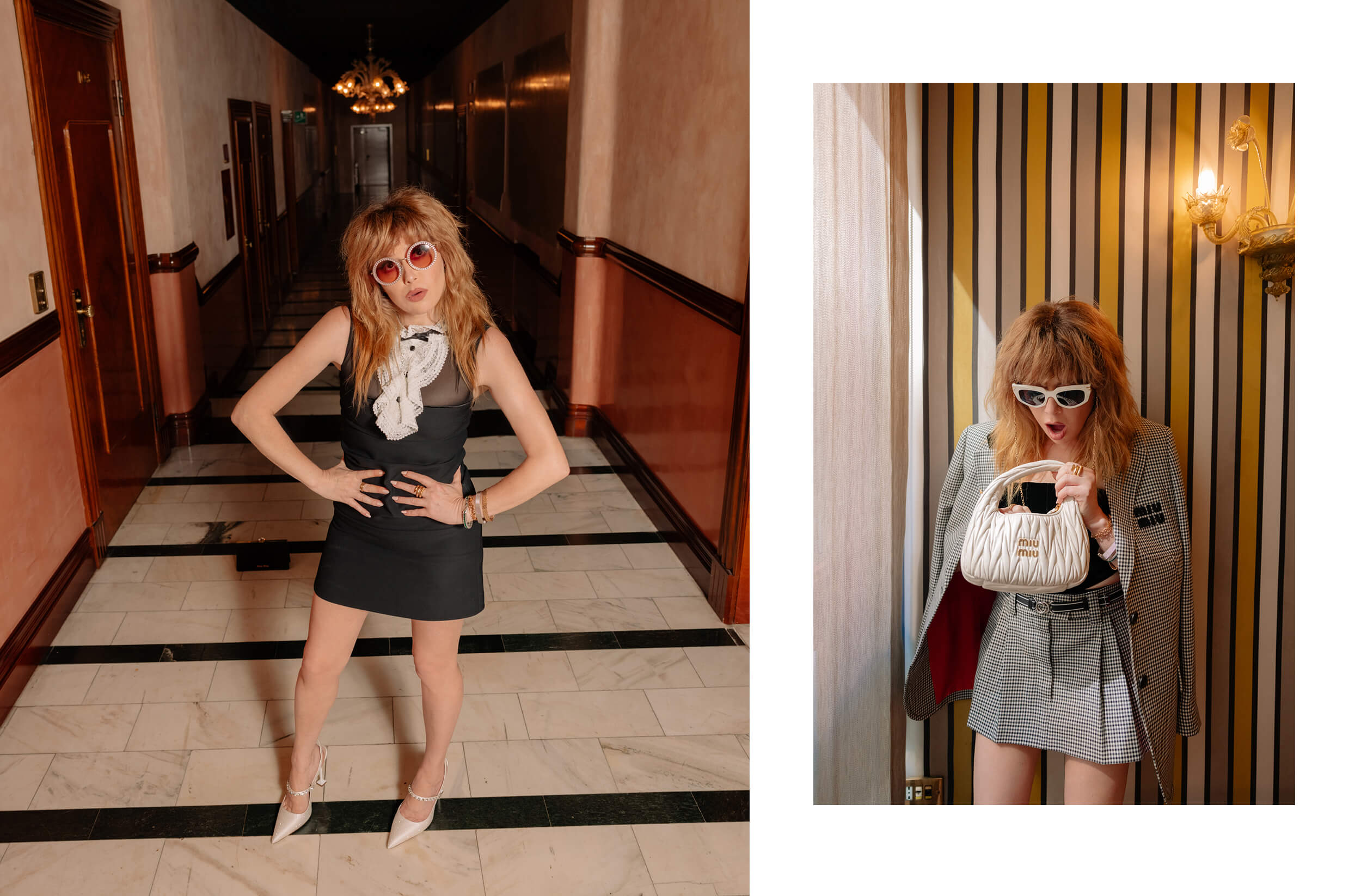Cups of coffee clink between the tables, and water surrounds us.
I’m about to interview Natasha Lyonne, a woman, an artist I admire for her talent, her ability, her immense irony, for the fact that she doesn’t take herself too seriously but she takes the right things seriously.
When I sit next to her, while she drinks a coffee, with big sunglasses on, immediately I understand, and she also tells me that she doesn’t like small talks, nonsense chatter.
We, then, talked about the new short movie by Janicza Bravo in collaboration with Miu Miu in which she stars and about how the truth is important – to speak the truth, to be true. Speaking of which, we also discussed her new upcoming show: “Poker Face”, a 10-episode mystery-drama series premiering on Peacock US on January 23rd, where she plays a woman with the extraordinary ability to determine when someone is lying, which she uses when she comes across strange crimes she can’t help but solve.
Because life is too short to waste time.
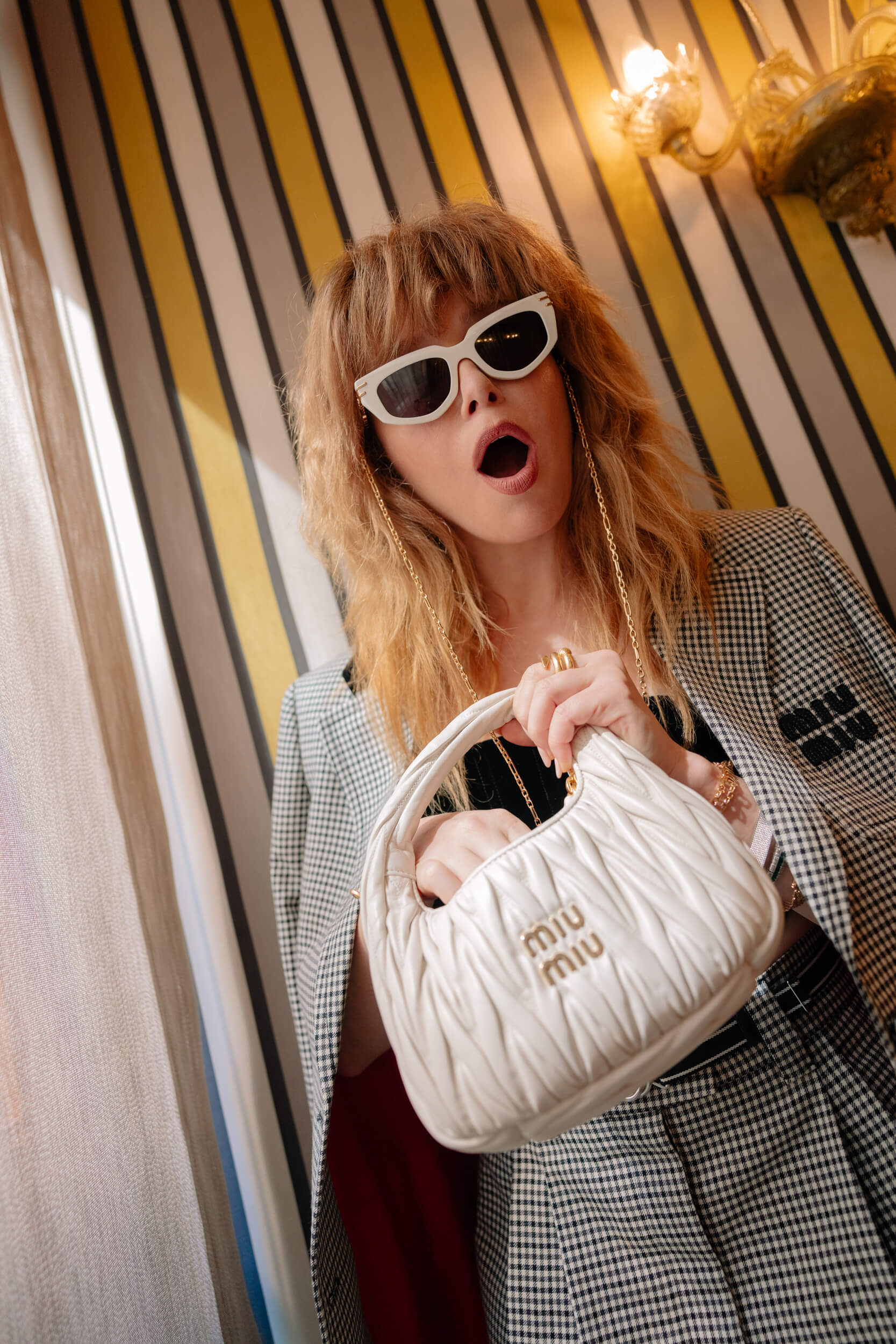
In Miu Miu Women’s Tales #23 “House Comes With a Bird”, you play Penn, a real estate broker. What was it like to be directed by Janicza Bravo, who’s also a friend of yours?
I absolutely adore Janicza and I respect her immensely. I think she’s a brilliant filmmaker and a brilliant human being, and I was so flattered and moved that she wanted me to be in her film.
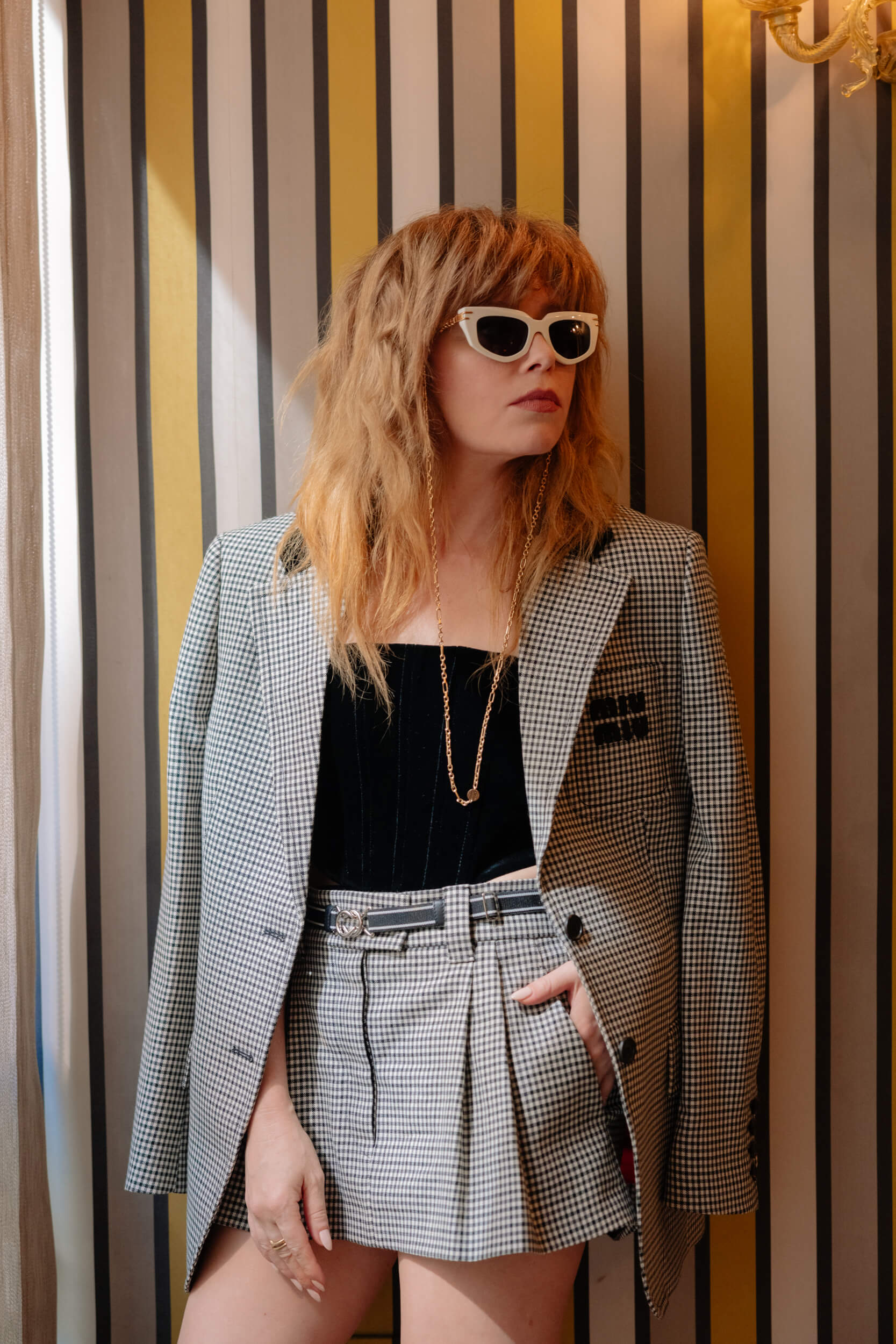
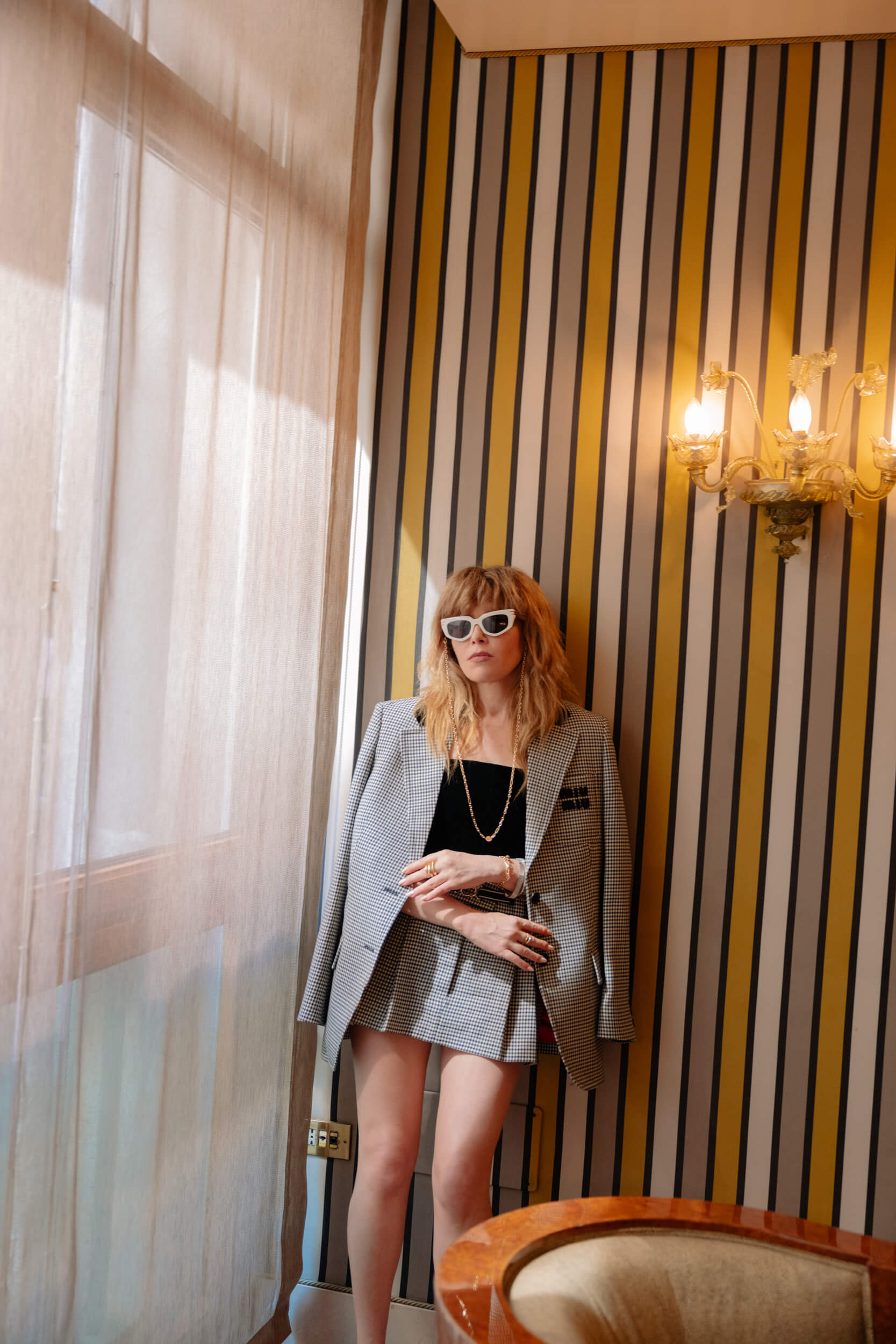
You’re also a producer and director, you’ve directed a number of episodes of “Russian Doll” for example. How does the feeling of what you’re doing change according to the “hat” you’re wearing?
I’m often asked this question about wearing many “hats”, but it’s funny that I think I see it as one large hat. It’s all of a whole, none of the elements really exist in a vacuum, so when I’m writing, directing, producing, starring, and managing the budget, basically overseeing all the department heads, I see it as one thing, almost more like a choreographer – I often think about how Bob Fosse must have felt doing those kinds of things. There’s something very fun and satisfying about assembling a team and watching them work brilliantly, they know so much that I don’t know, so I try to surround myself with people who know those things. I love people who are experts in their field and I have so much respect for people whom I collaborate with.
I really see all that as a deeply collaborative art form, so all of the elements have to come together perfectly to make something worthy of being in a frame that then you would edit and have people watch.
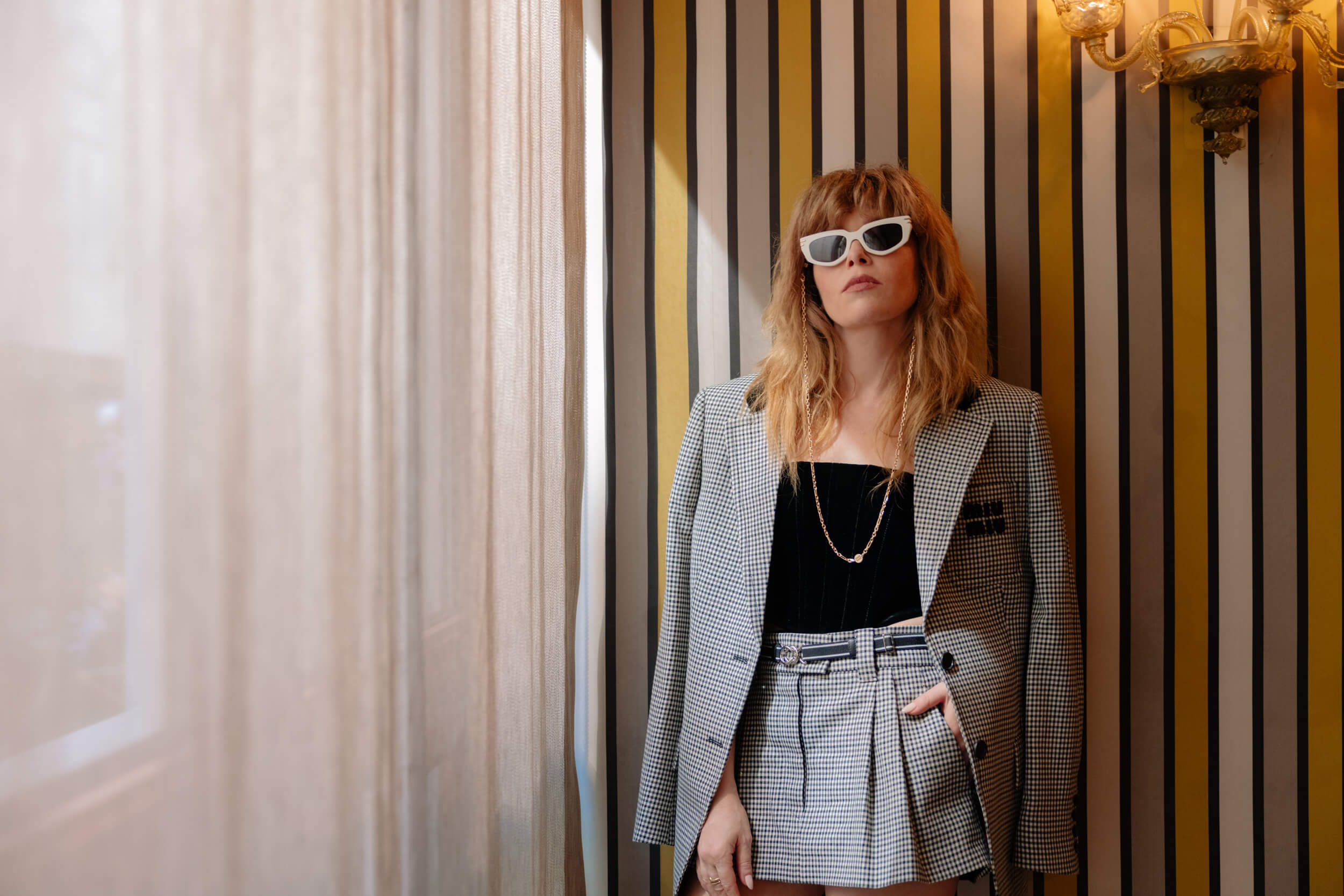
“I love people who are experts in their field”

As they said in the panel perhaps you might be one of the next directors of the Miu Miu Women’s Tales. What would you like to bring to the table if this happened?
You know, it’s always been about the schedule for me with directing one of the Miu Miu Tales, so I’m not sure, but at one point, we had been talking about one, just before the pandemic, and it was going to be a little bit of a riff on “The King of Comedy”, that was the idea at the time. Let the record show that it didn’t happen, that’s the most important thing [laughs] because it’s important that people know that not only would I never spoil something but that I never have in my whole life, I’m mostly known for not being clunky whatsoever, I’m a precision-based person, much like an Olympian but with coffee.
So, that time when we were talking about it, it was quite interesting, but then the pandemic came and I got so busy with other things, but who knows? I’m sure we’d come up with another idea if we ever decided to do one. If I did one, I’m sure it would be because I have a deep love for the Italian filmmaker Lina Wertmuller, who’s one of my all-time favorites, alongside, of course, Fellini, and Miu Miu is an Italian house, so I’m sure that some iteration of that would find its way home.
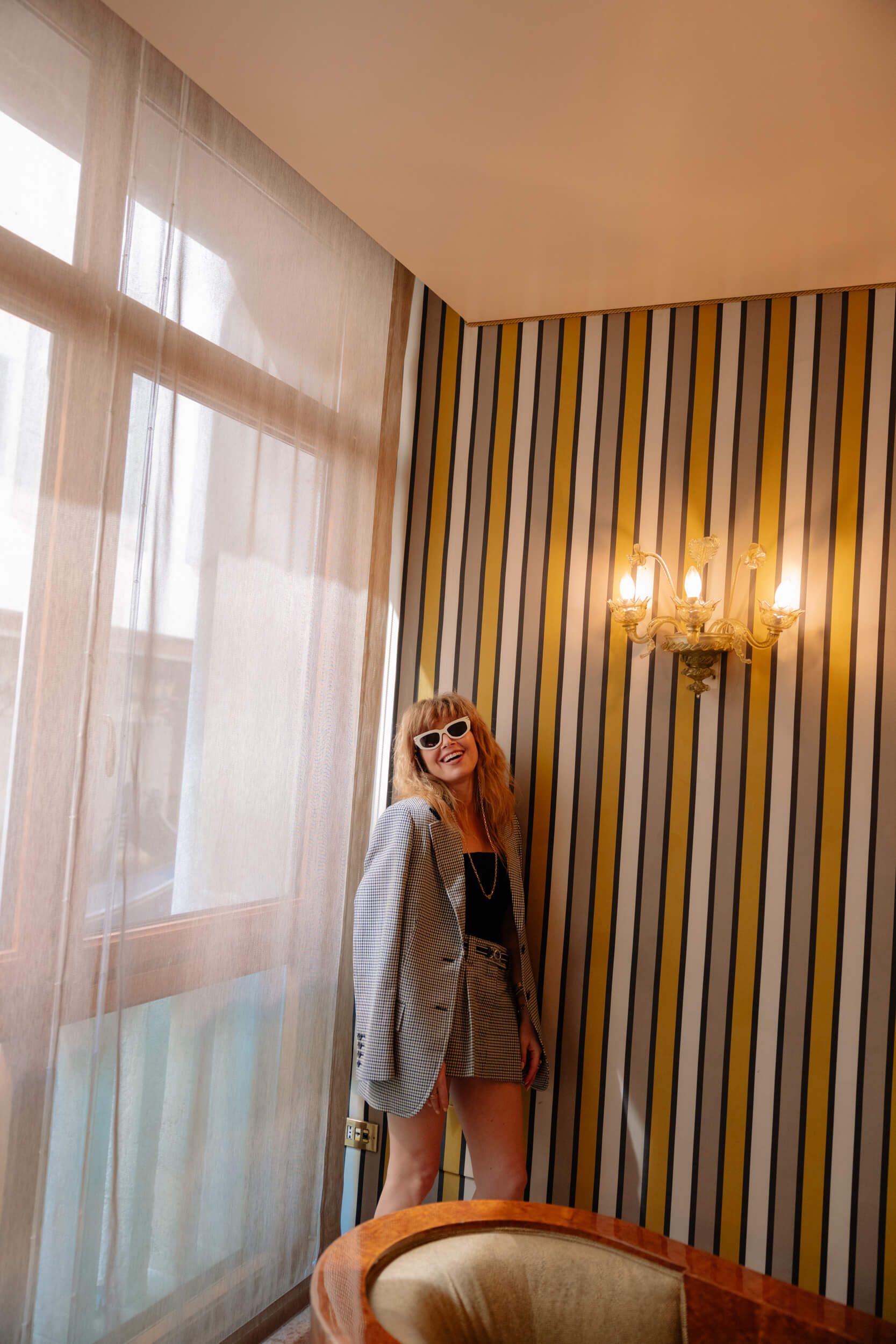
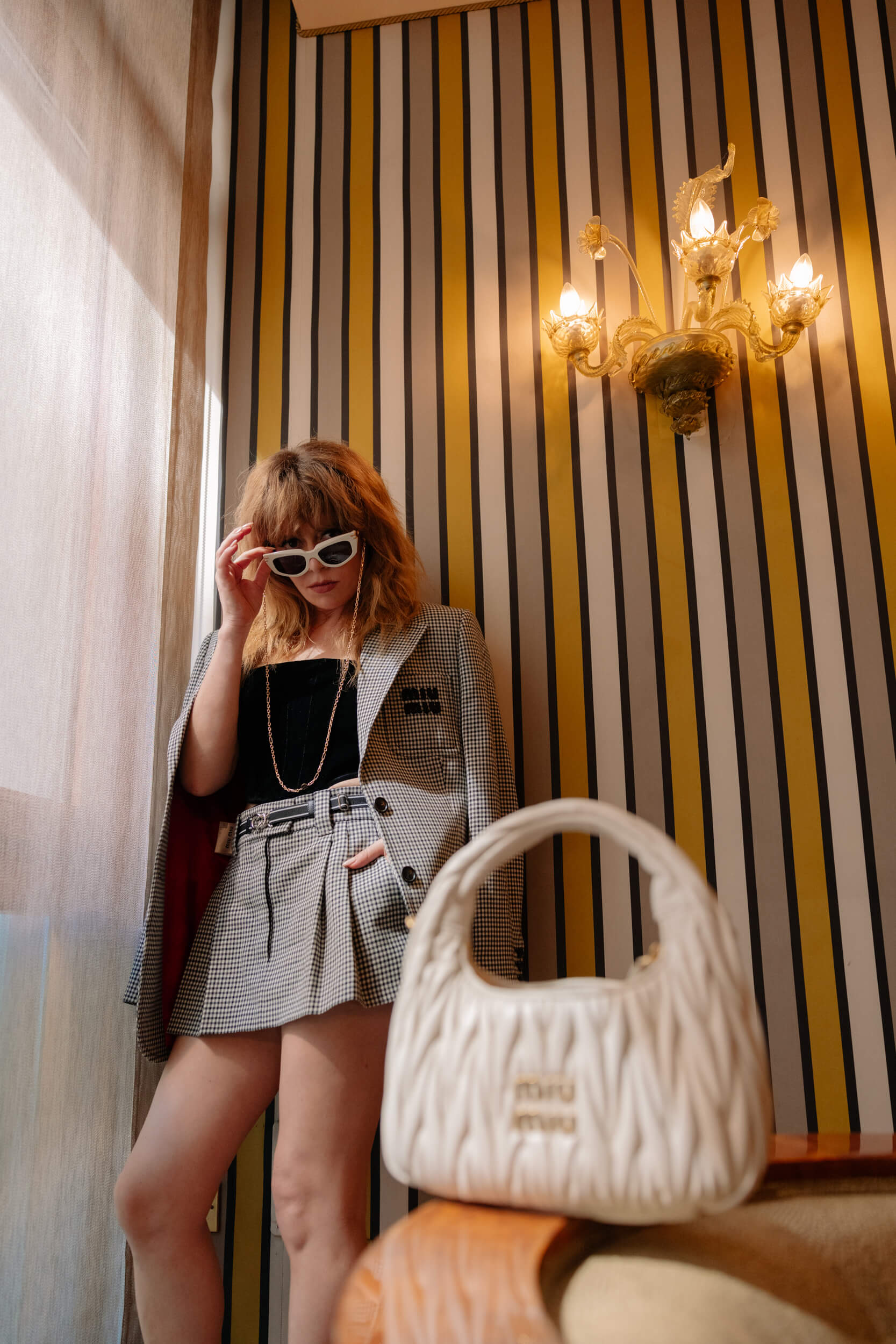
In the panel, you spoke about the truth of the projects you do, and, also, you once said, “My whole trip is just to try to tell the truth.” What’s the truth you want to portray?
Well, the truth is very important to me, and I think in so much of the work that I greatly admire, I see strains of that, people really trying to make sense of this brief life we’ve been given, and the absurdity of the whole setup, that being that we live and we die, and injustice is so pervasive, and it’s everywhere and it makes the whole thing make no sense at all. There are so many aspects of life that are too brutal to look at, and then there’s so much beauty to it, at the same time, and being a person is both a very light and a very heavy trip for every individual, I guess. I think that each person’s case is their own, but it ultimately feels deeply important to them.
For me, the arts and life, in general, should be about being in communication around that with each other, in some way, and trying to address that either sideways or head-on, through jokes, music, film, or a life’s work, whatever it is, it’s inevitably what we’re doing.
By saying that I just want to tell the truth, I mean that the only category that I loathe is the one made of things that are meaningless in nature and intentionally meaningless, I often struggle with that. I often have problems with small talk, for example, I don’t understand why people don’t want to do big talk, I think it’s weird, it’s weird that we even call it “small talk” … Then why talk at all? I certainly understand the value of being polite and making one another feel comfortable, but I often wonder if we wouldn’t feel more comfortable if we told each other the truth – maybe we wouldn’t feel so alone and so weird. Sometimes, we’re a little uncomfortable in our skin and in our bodies, and we’re unsure about the day and unsure about our futures, or we’re regretting things from our past, but we don’t talk about those things often enough, easily enough. I’d like to see that be more of what we do for each other as people, I think it would be a gift for each other to be more truthful even in seemingly smaller and meaningless interactions.
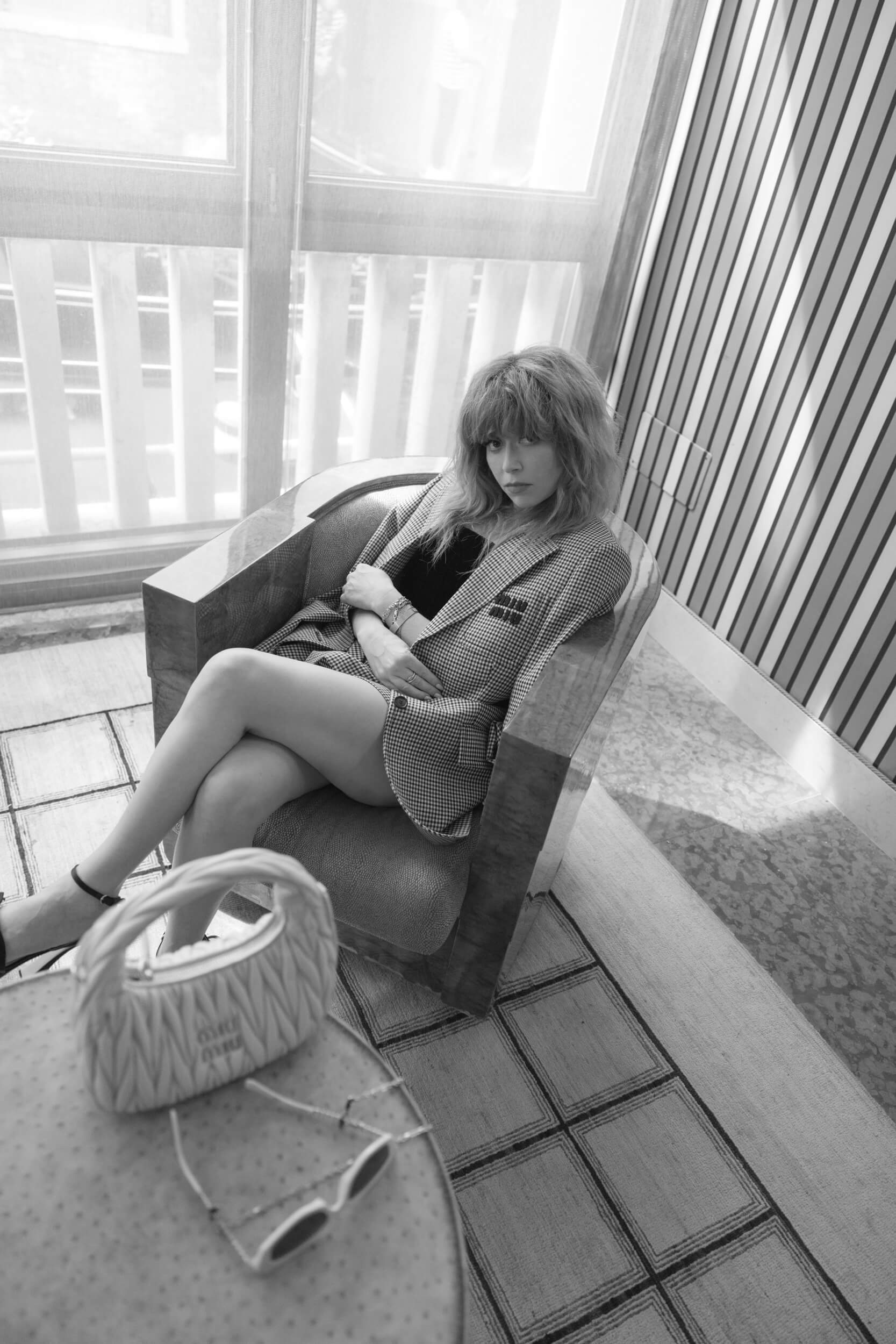
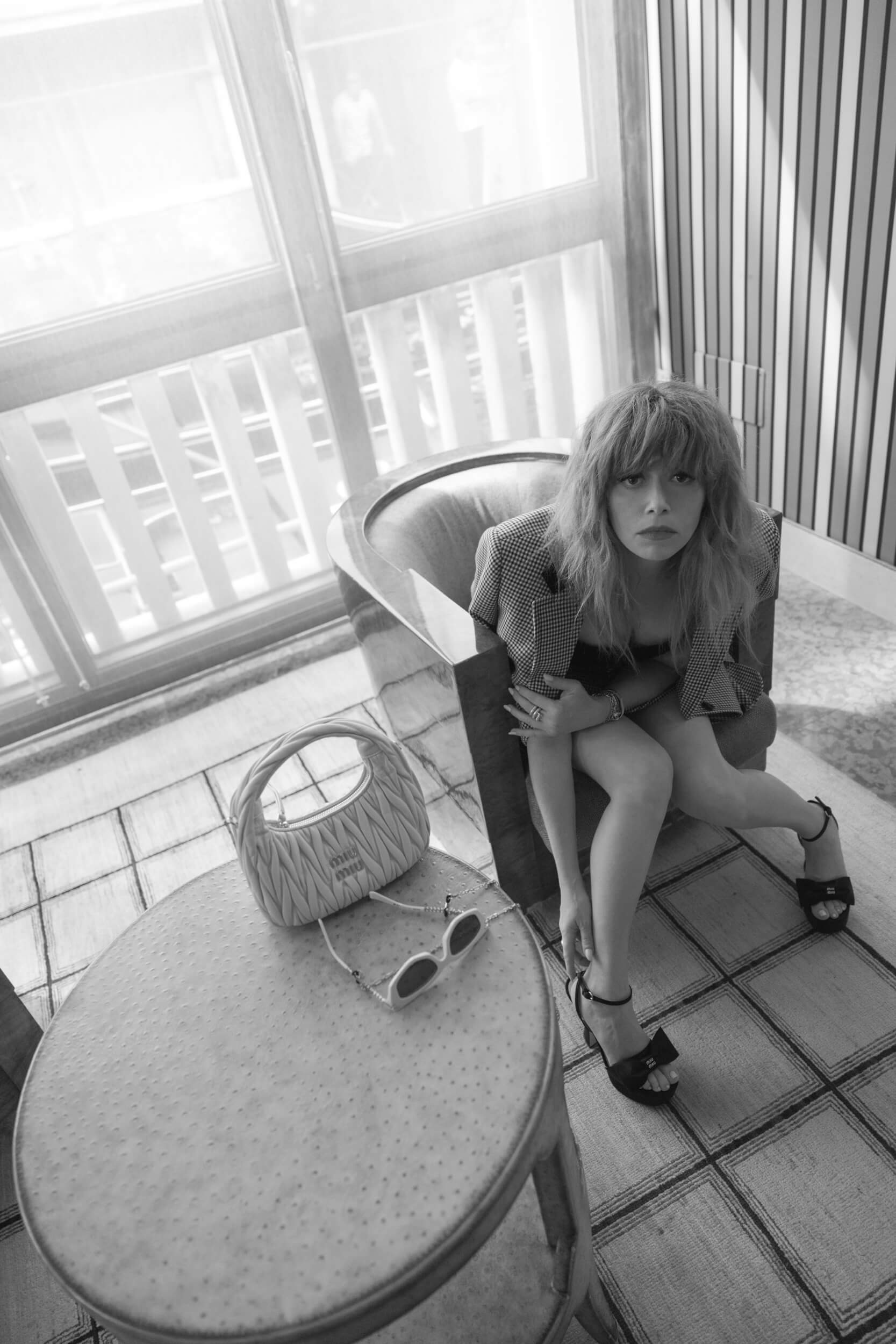
“I often wonder if we wouldn’t feel more comfortable if we told each other the truth – maybe we wouldn’t feel so alone and so weird.”
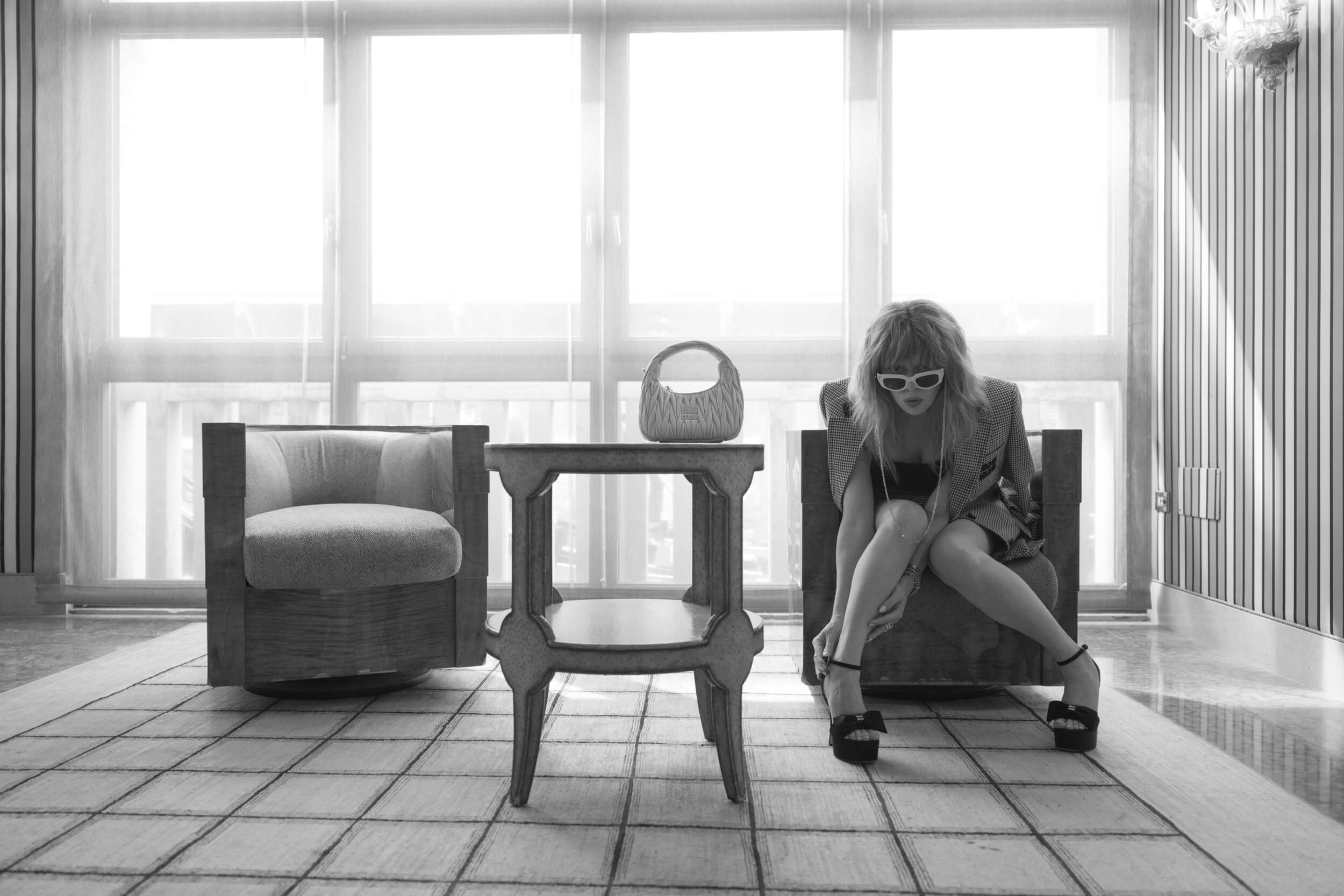
When we talk about costumes and clothes in general, oftentimes we also talk about feeling comfortable in our own skin, somehow. When do you feel the most comfortable?
I really love a certain kind of integrity to personhood, so I always do feel more comfortable when I’m in my own skin, I don’t really enjoy feeling like I’m in a loner body.
That said, I love aesthetics, so I love that there are people who are masters of their craft, whether that’s makeup or hair or photography, or costume, there’s something joyous about it, something fun in being able to see that other version of yourself, and creating characters. David Bowie is obviously a great example of somebody who’s always felt like, in some ways, he was changing thanks to costumes, hair, makeup, or different albums, and photography attach to them or cover art, but he felt some sort of prism of a very defined self and personhood. So, I really enjoy that kind of thing.
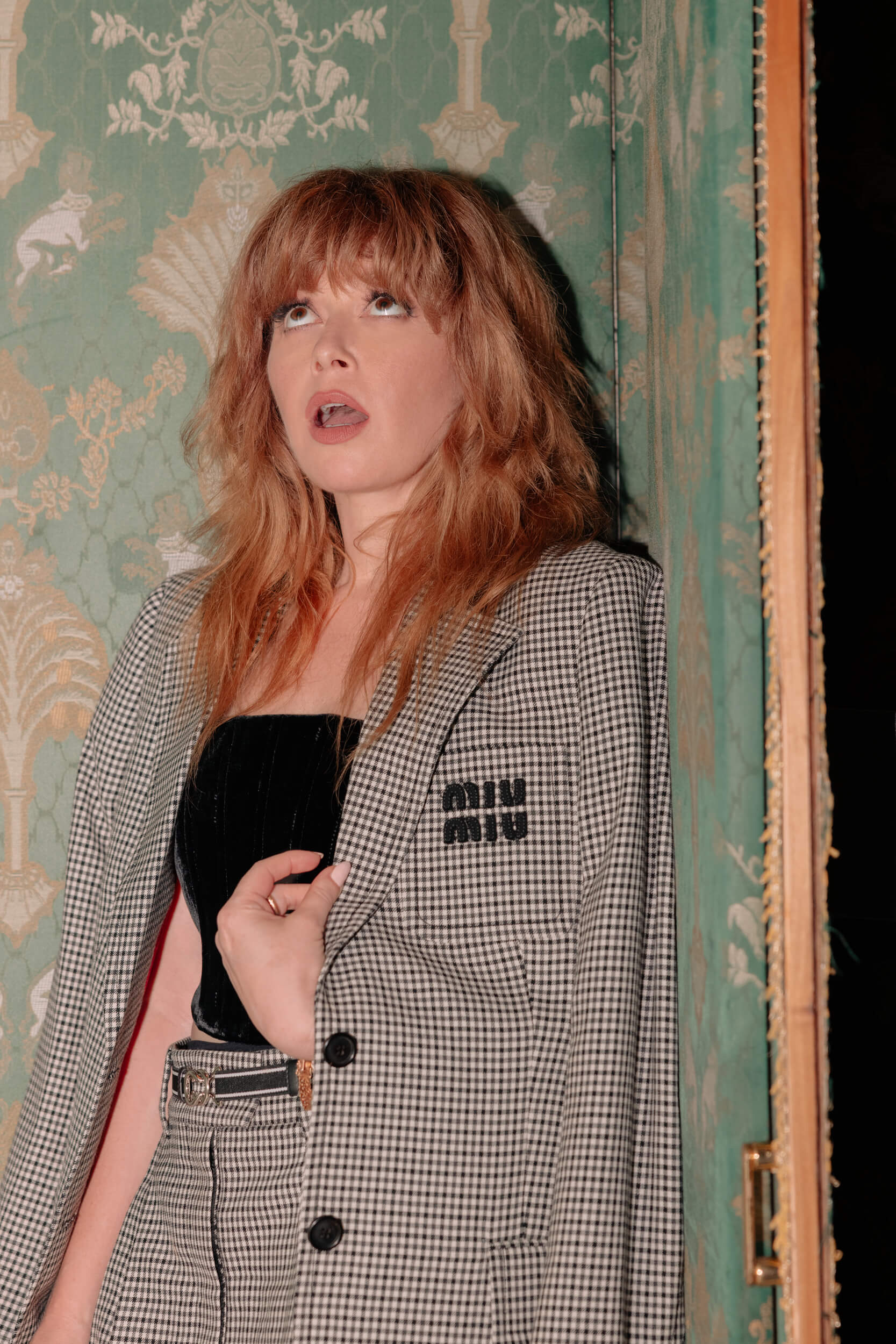
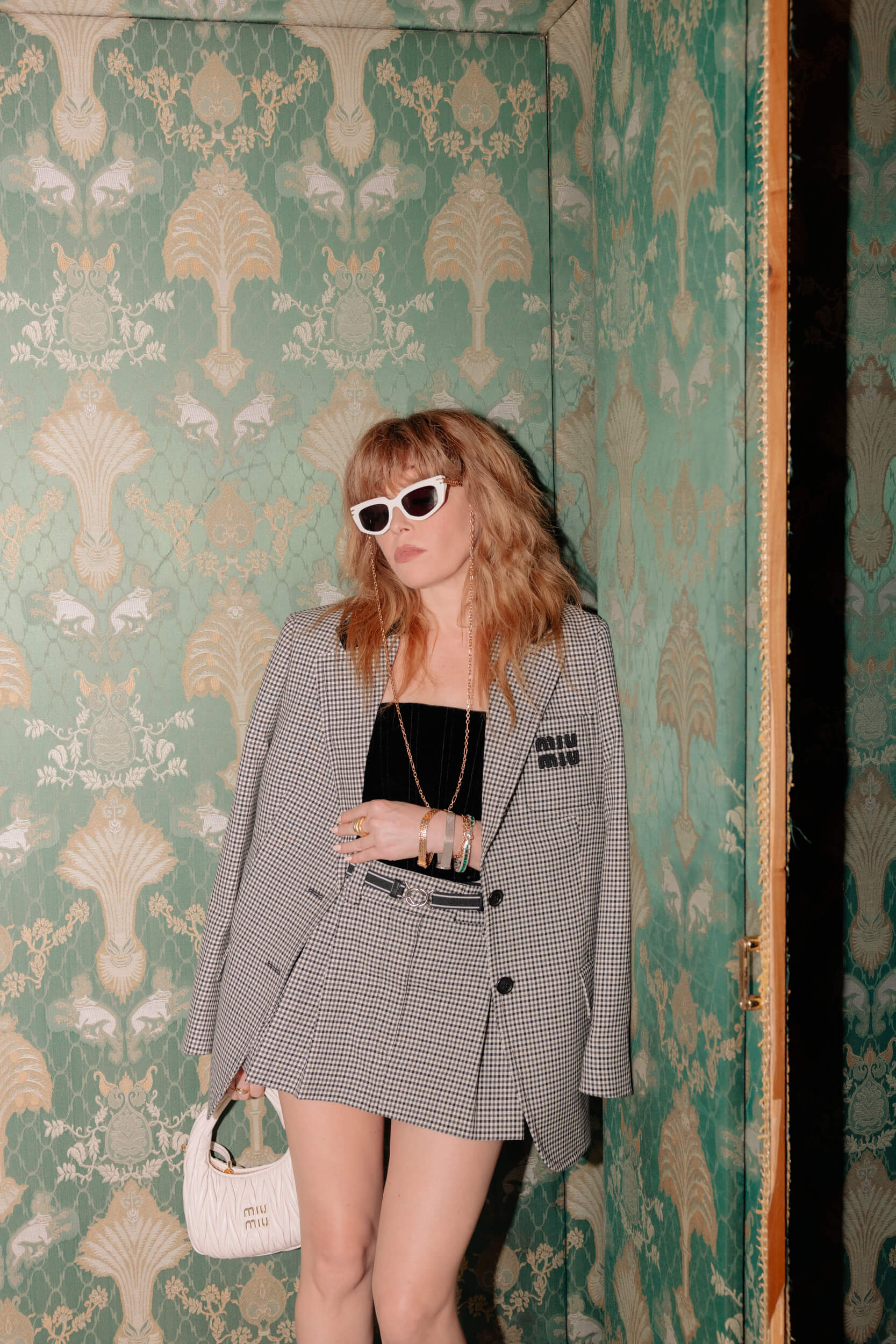
Speaking of “Russian Doll”, the first season has a stronger focus on death, while the second one is all about how to start living. How do we start living?
Yeah, I guess season one was “how do I stop dying?” and season two is “how do I start living? – case and point, here come our cheeseburgers” [laughs]. In many ways, I think that both seasons are also temporal meditations, to a certain extent, they’re both questioning the nature of time, which seems to be the biggest trouble that we face – how limited it is, how we can’t get it back, but even logistically, how irritating it can be in small ways, like flight connections. It’s a crazy thing, time, the whole world revolves around it, and it is also associated with both history and the future, you must look back in order to look forward.
From a quantum physics standpoint, I think that one of the big questions of our time is: why is it that I can remember the past but I can’t remember the future? There’s nothing, scientifically, that would make that logical. I’m fascinated by that question, so I became interested in time travel as a sort of existential question. Of course, it’s a deeply philosophical show in its nature and, hopefully, a funny one because these are crazy concepts and yet, here we all are living them, so, there’s a universality to a deep specificity.
In season one, mine is almost a character who hasn’t really ever taken the time to get totally right with herself or honest with herself, to a point that she wouldn’t even notice that she’s living a life in a strange loop – if insanity is defined by repeating the same mistakes again and expecting different results; once having had that breakthrough, the real question is, “But why am I wired that way?” and you go back in order to sort of see it for what it is, and be able to step forward.
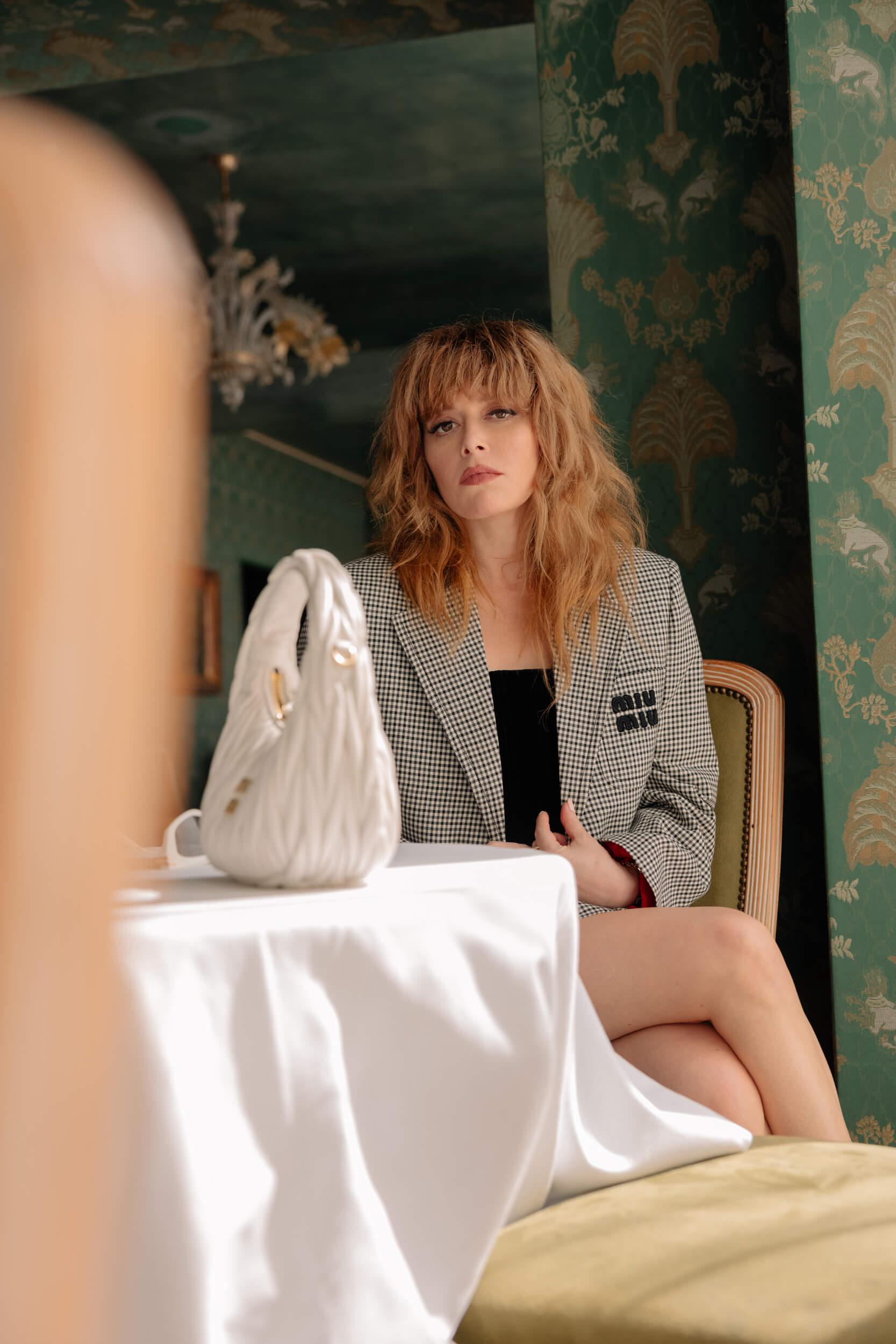
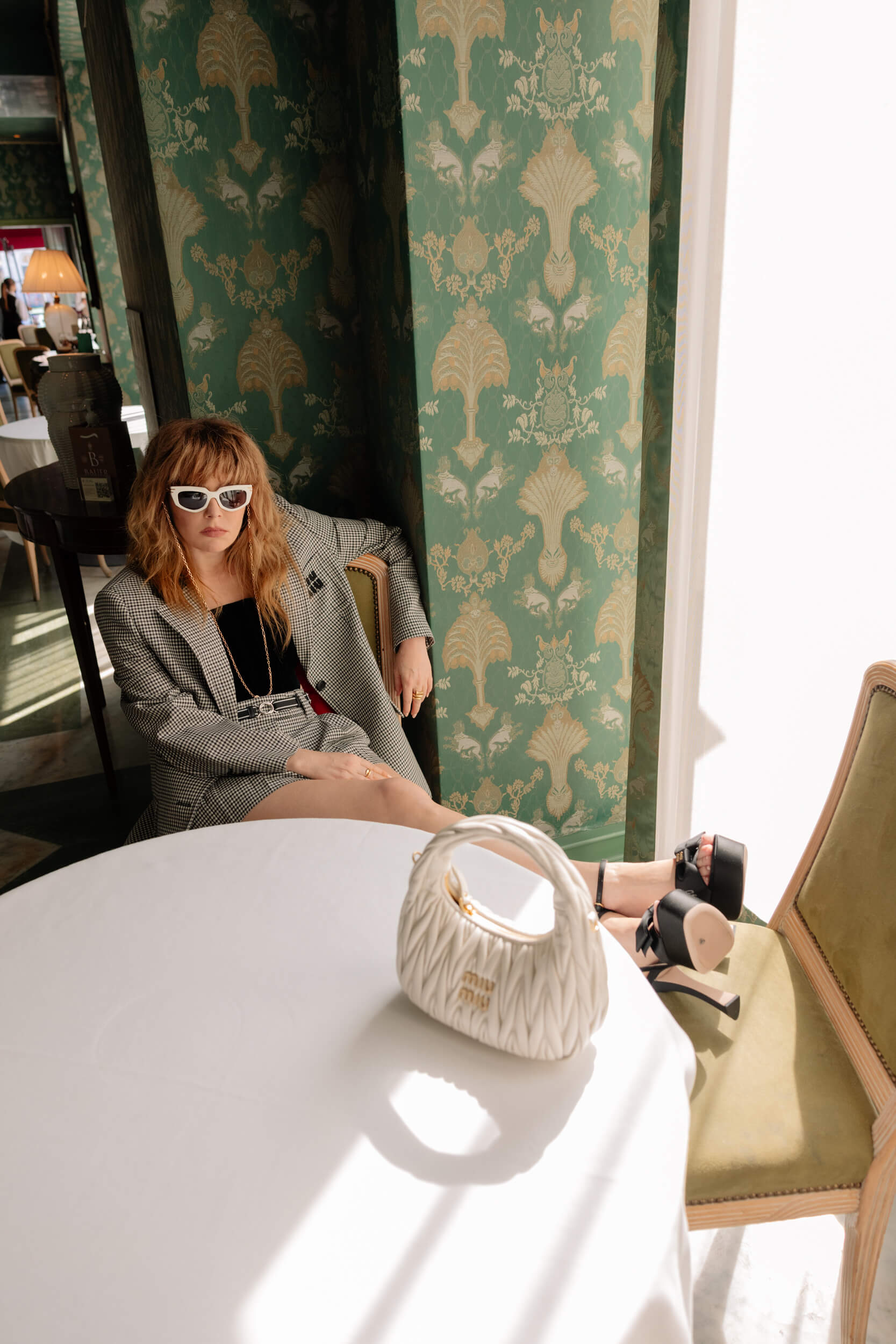
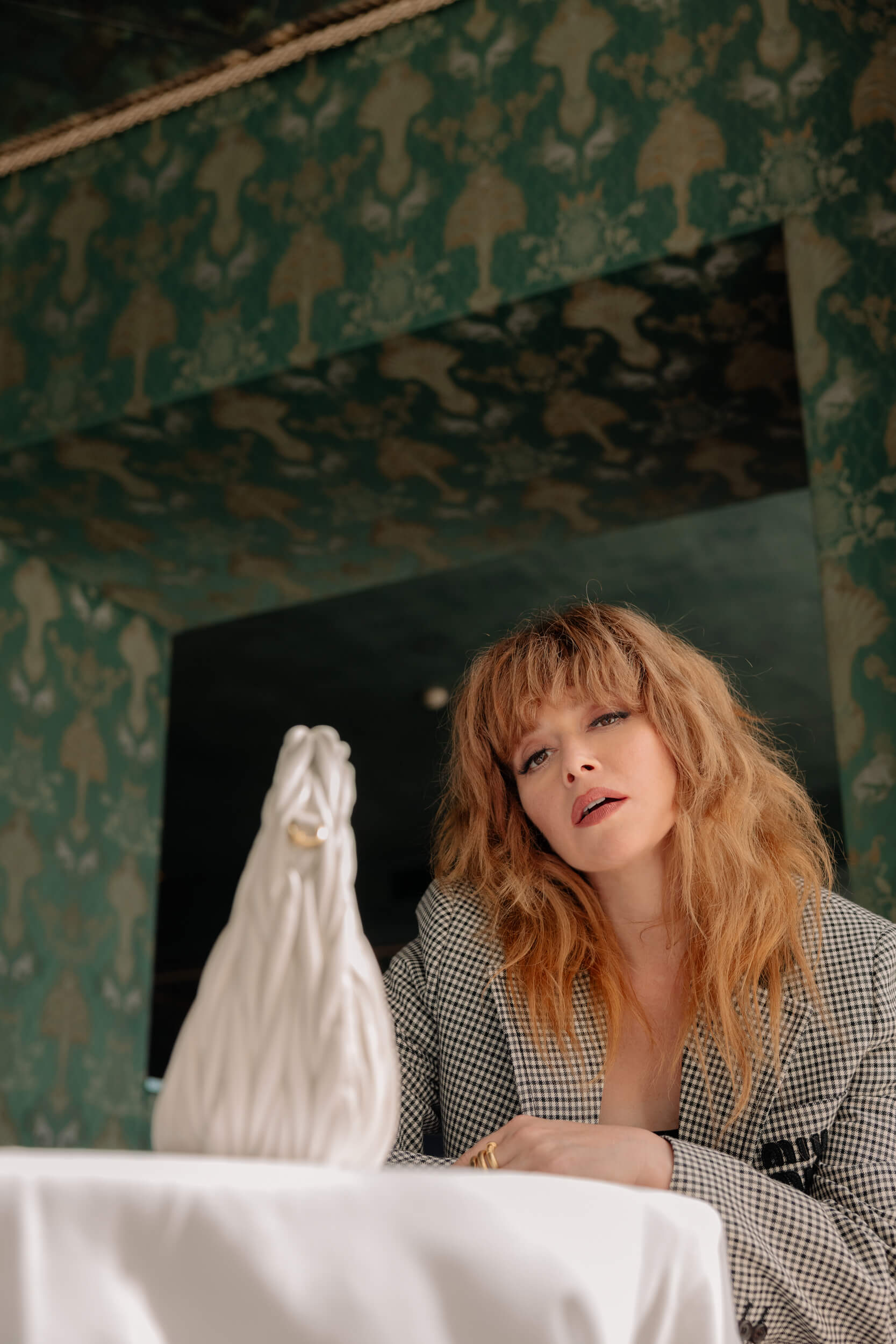
“Season one was ‘how do I stop dying?’ and season two is ‘how do I start living?'”
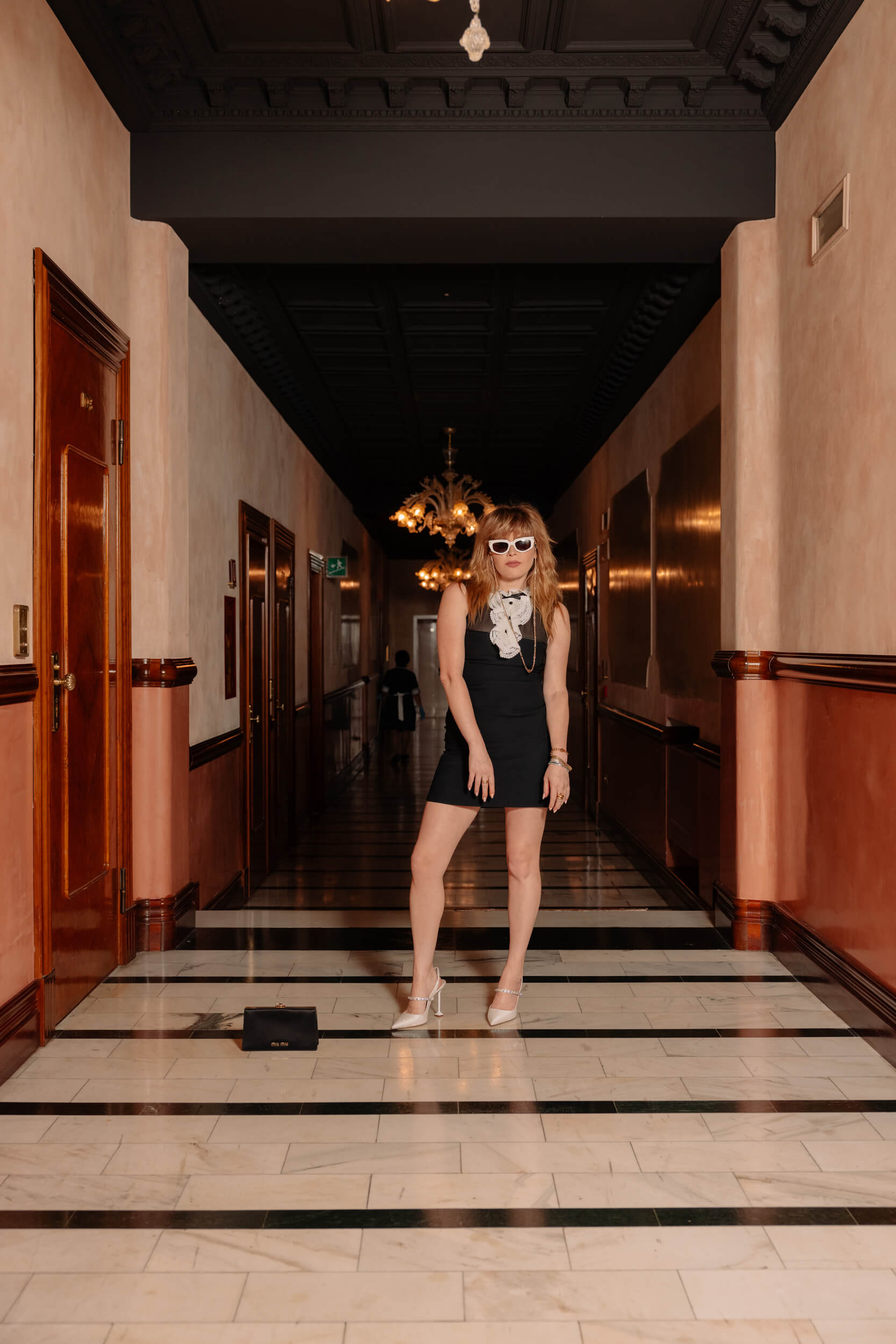
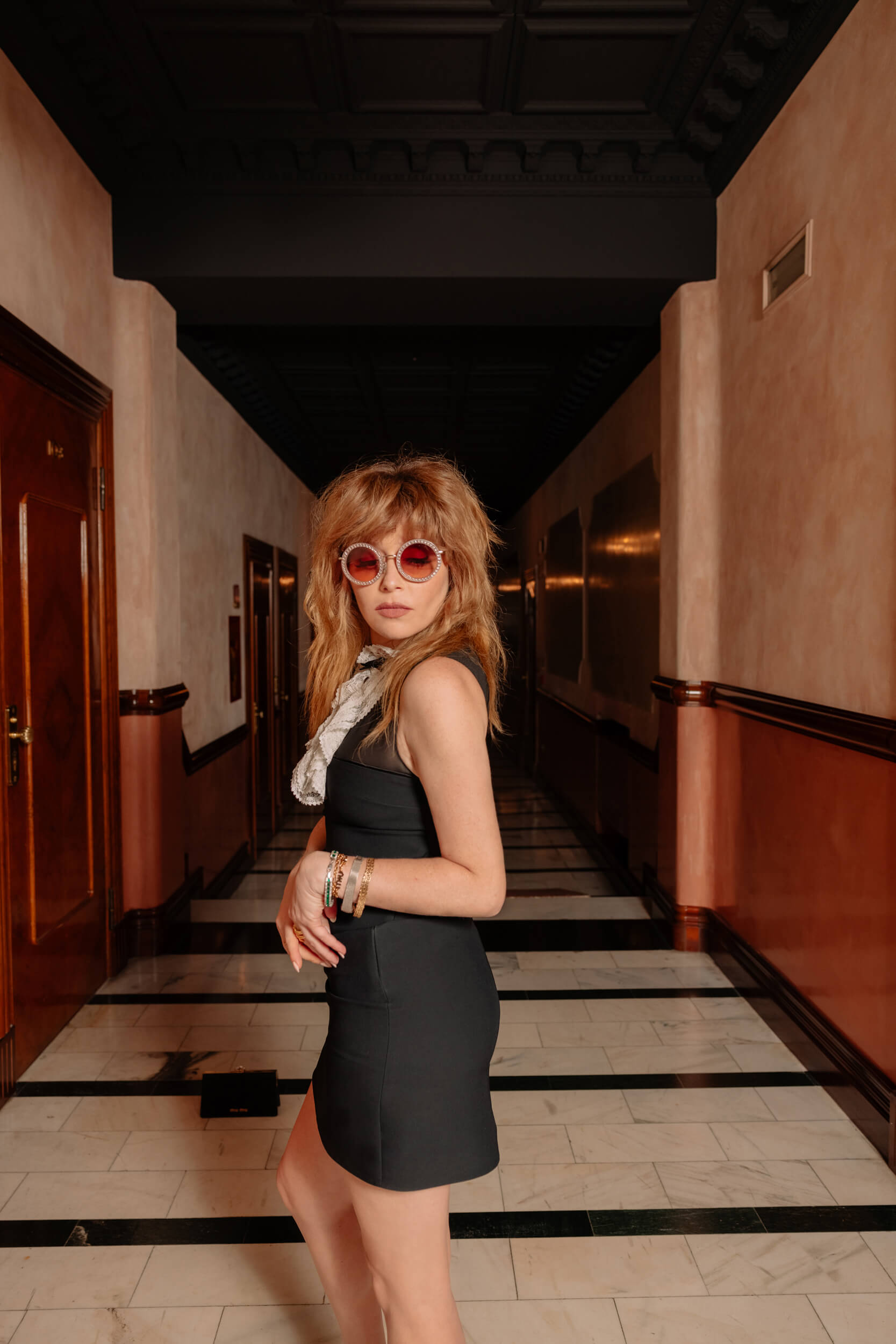
What’s your most remarkable act of rebellion?
I think, ultimately, it’s being myself. You know, there’s this Camus quote that says: “The only way to deal with an unfree world is to become so absolutely free that your very existence is an act of rebellion.” I think I’ve worked hard in this life to try to make that so. Even if life makes no sense, the one thing that I do have ultimate control over is being myself, whether that’s palatable or easy for myself or anybody else, so I work hard to do that in an effort to feel free.
You’re the protagonist of Peacock’s new murder mystery show “Poker Face” by “Knives Out” director Rian Johnson. In which way did you manage to jump into the shoes of this incredibly intuitive character you play?
I think it’s very organic for me to want to play somebody who always tells the truth. I think telling the truth is my best and worst quality trait. But unlike Charlie, my character, I don’t actually have the power to know for sure when someone’s lying, I only have an instinct that maybe something is fishy. What’s so special about Charlie is that she uses her ability to help the people who can’t help themselves; also, what’s really cool about the show is that just because she has a super radar for the truth doesn’t mean she has all the information, so each episode is a full detective case where she knows when something is wrong but she still has to do all the work and all the math to figure out the puzzle without any superpower at all.
So, as we said, Charlie has a gift: she can always tell when someone’s lying, which is oftentimes pointed out as different from “always knowing the truth”: in which way does it prove to be different for her within the storyline? In which way is it different for you?
Charlie has a great line that Rian wrote in the first episode: “Lying is like birds chirping: people lie all the time, the trick is to figure out why someone is lying”. I think that encapsulates the devil-edged sward of her gift and her ongoing challenge week to week. In a way, it mirrors anything in life where sometimes you have an instinct about a person that tells you, “Something here feels weird”, but you really have to get into the hood and investigate because that weird could even be a good thing. You don’t really know, but sometimes your antenna goes up and lets you know that there is something to dig deeper into in this area.
Sometimes it takes work to figure out if that’s a good thing or a bad thing; it might be that somebody is lying to protect somebody, not to murder somebody, you never know until you really investigate.
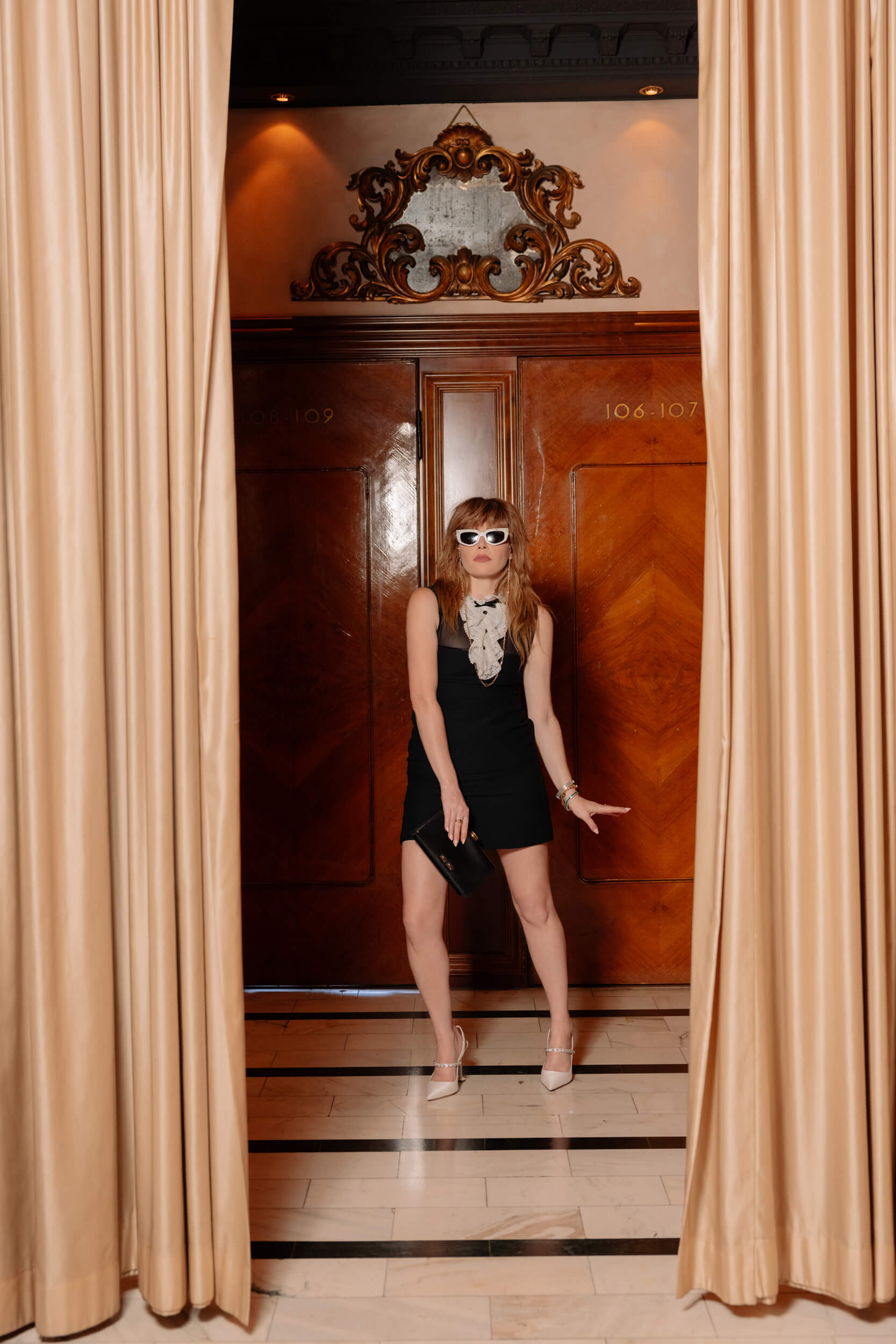
Charlie says people tend to lie more about “little meaningless things” rather than their “dark secrets”; can you relate to this? What’s your viewpoint on the dynamics of lying?
I guess I always think that it’s a shame that society values small lies so much. Sometimes I think that when people ask each other “how are you?”, it would be more loving to tell one another the truth, which is that the way we are is often complicated, we’re often full of joy and full of tears simultaneously, or we’re really excited about the future but also really overwhelmed or tired, or feeling very in love but very scary that someday it’ll end. Usually, the feelings of life are complex but we have the instinct to simplify them and think: everything is great, I’m fine; it’s been my experience that almost never are people actually fine, it’s the weirdest answer of all, and the biggest lie of them all. We’d probably do each other a favor to be more honest in small interactions, so we felt less alone in the world and more like we were in this thing together. Instead of saying “I’m fine”, maybe sometimes I would say, “I’m 50/50”; in this way, we would just keep it moving, and the interlocutor maybe would say “Hey, me too”, and we would keep going.
The idea behind the project was born during a dinner conversation: you and Rian were basically chitchatting about the pleasure of detective shows and came up with the idea of creating one. Do the best ideas come while we’re eating, or…?
David Lynch knows that the best ideas come from sleeping. So, always be asleep. I don’t know how many times I have to say this but go to sleep [laughs]. I’m half kidding, but I do think that Rian already had an idea that he wanted to do this, and I’ve had a long love affair with this area too. I’d always thought of Nadia from the show that I’ve created, “Russian Doll”, as somebody who’s almost a bit of a detective but of philosophy or theology, for lack of a better term; she was somebody who was also on the case but of her own existence and mortality. So, what was fun when Rian spoke to me about this idea, was that it felt like an extension that was almost once removed; here, on “Poker Face”, I would be an actual detective who would be on a criminal case from week to week, but still, I could enjoy my deep love of Philip Marlow. I’ve always loved noir storytelling, and Rian and I shared a great love for detectives from the 30s, the 50s, and the 70s. What is so exciting is that if it was something that I was going to take on, Rian was exactly the guy to do it because he’s such a beautiful mastermind of the puzzle box.
What was so fun and beautiful about “Poker Face” is that we really got to do it together. It was something where it felt like this would have been a beautiful partnership, more than anything, so it really felt joyous and fun and inspired. I think we both thought, “Wouldn’t it be fun to just have something that we love and get to work together and in success maybe get to work together for a really long time?”. The spirit of it was like a dinner between friends, where you say things like, “Wouldn’t it be fun if we could have these dinners forever?”.
We grew a community around the show, in the sense that, for example, there was Chloë [Sevigny], who’s worked with me in “Russian Doll” and other movies, as well as my friends from “Orange is the New Black”, Clea [DuVall] and Dascha [Polanco], who were also in “Russian Doll”, and the same goes for Janicza Bravo who directed the finale, who’s such a close friend of mine. We really thought: wouldn’t this be such a joyous place to have all of our favorite people keep visiting, all the people I know I love to work with? The episode I wrote and directed this season I wrote it with Alice Ju, who’s such an incredible writer I’d worked with in “Russian Doll”. I see my favorite part of this business as being a way to make things with the people I love and respect the most.
What’s your special gift?
In many ways, I think that my whole life I’ve been able to make people laugh, even under the darkest of circumstances, and it is because even under the darkest of circumstances I see the world in a very strange way and it stays funny to me. I think that the whole setup is so deeply absurd, to begin with, like the fact that we pretend that life is so high stakes, and we run around, falling in love, with broken hearts, having children, and deciding that maybe it’s too late, and if it’s after our 40s we think, “Should I do this? Should I have children? Should I start a new business and quit my job? Should I invest in bitcoin or is crypto over? Should I write a novel?”. We pretend like everything is very, very important and it certainly is, but at the end of the day, no matter what we do, whether we get in shape or we don’t, whether we get that expensive blazer we’ve always wanted or we don’t, whether we go on vacation or we stay at home, we’re still going to die inevitably, and I think that that’s a deep cosmic joke, and I make my business to never lose sight of that, no matter how high the stakes are. So, I think it always lets things be a little cracked even under the craziest of circumstances.
Ultimately, whether or not I miss my train can only ever be so important relative to the stakes of the reality of life; ultimately, a day is going to come when I miss the big train and there are no more trains running; so, I always think it’s fun to keep that in mind and I always feel like when other people are making me laugh, or when I’m making somebody else laugh, or when we’re laughing together, it’s like a third space and it’s a gift that it exists at all in this world, that we can be doubled over laughing and forget everything else in that moment that we think is so important; it just really is the ultimate leveler.

